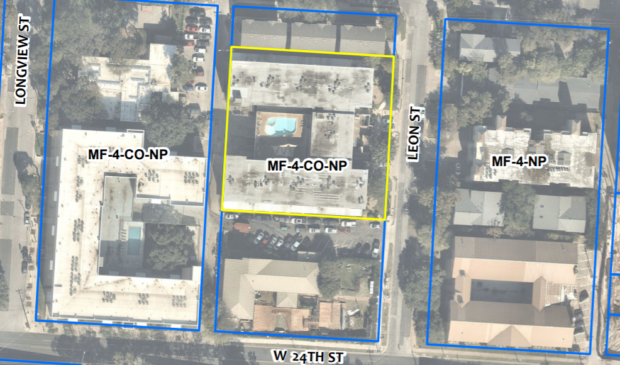Planning Commission OKs taller building in West Campus
Thursday, March 14, 2019 by
Jack Craver The Planning Commission granted near-unanimous approval for a rezoning in West Campus to allow an old student housing complex at 2408 Leon St. to be replaced with a new, larger apartment complex.
The property owner, Arlington Capital Austin, wants the lot to be rezoned to allow greater height for the complex. The developer envisions a taller apartment building with commercial space on the ground floor such as a cafe or retail shop, explained the agent, Leah Bojo of the Drenner Group.
The applicant is seeking a zoning change from Multifamily Residence-Moderate-High Density (MF-4) to General Office-Mixed Use (GO-MU), which allows a height of up to 60 feet. Through the code amendment, however, the developer hopes to increase the University Neighborhood Overlay height limit for the property to 65 feet.
Just by participating in UNO, explained Bojo, any project must make 20 percent of units income-restricted – half for those below 60 percent of the area median income (AMI) and half for those at 50 percent AMI. However, projects can get an additional 15 feet of height if they provide another 10 percent of affordable units or pay a fee-in-lieu. Under the zoning changes envisioned, the project will be able to reach up to 80 feet. However, said Bojo, in all likelihood the project will only reach about 75 feet.
At the hearing Tuesday night, none of the commissioners objected to the stated goals of the development. The only concerns, expressed by some commissioners as well as the head of the University Area Partners neighborhood association, related to process.
Mike McHone, vice president of the neighborhood group, urged the commission to do the rezoning as part of a code amendment to the UNO district, where the property is located.
“The whole idea of UNO was to present a combined area that would have administrative rules that would allow everybody to participate equally,” he said, bemoaning a zoning process based on developers “finding the best attorney” to get their desired entitlements approved.
Commissioner Karen McGraw similarly argued that rezoning the property without going through the code amendment process was a betrayal of the work that volunteers in the neighborhood did in crafting UNO more than a decade ago. The vibrant mixed-use neighborhood that exists today “would not be there today if it had been done piecemeal,” she said.
However, Commissioner James Schissler said that the code amendment process was extremely lengthy and unlikely to be done anytime soon, so in the meantime, the commission should facilitate the project by giving the applicant the necessary zoning.
Bojo agreed that waiting for the code amendment process could lead to missed opportunities. “What we’re trying to do here is provide more housing and more affordable housing than the regulations on the ground currently provide,” she said.
The commission voted 11-1 to proceed with the case, with only McGraw opposed.
McHone raised concerns about the developer getting the entitlements and then using them to do a large commercial building, rather than student-oriented residences. Bojo assured the commission that that was not the intent, but Chair James Shieh suggested a conditional overlay to ensure that the developer stuck to the stated plans.
The commission approved a conditional overlay to prohibit more than 25 percent of the building from being used for commercial purposes. Commissioners Greg Anderson and Jeffrey Thompson objected to the CO, saying it was both unnecessary in the near future and might prevent a worthy project serving the area for decades from being built.
“It would be a student-oriented building and to say that we’re not going to allow that in this area makes absolutely no sense,” said Anderson.
The CO was approved with only Anderson, Thompson, Schissler and Commissioner Yvette Flores against.
The commission ultimately voted to approve the requested zoning, with only McGraw opposed, and then moved on to discuss the initiation of the code amendment. Once again, there was a call to postpone initiation but it failed, with Shieh, McGraw and commissioners Patricia Seeger and Robert Schneider in favor.
The commission then voted to initiate the code amendment change, 9-3. Shieh, McGraw and Seeger opposed.
Map courtesy of the city of Austin.
The Austin Monitor’s work is made possible by donations from the community. Though our reporting covers donors from time to time, we are careful to keep business and editorial efforts separate while maintaining transparency. A complete list of donors is available here, and our code of ethics is explained here.
You're a community leader
And we’re honored you look to us for serious, in-depth news. You know a strong community needs local and dedicated watchdog reporting. We’re here for you and that won’t change. Now will you take the powerful next step and support our nonprofit news organization?






